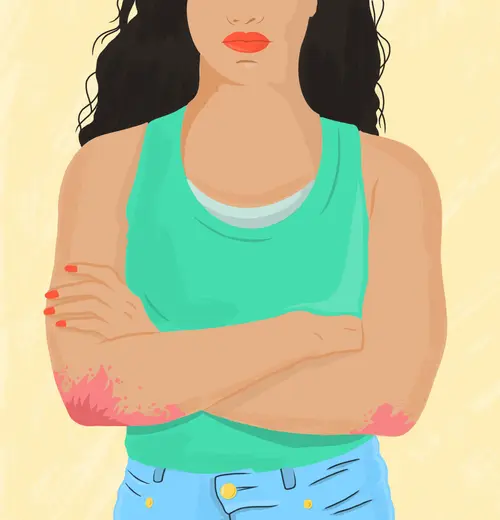Pustular psoriasis is a rare skin disease. It makes your skin become red and painful with raised, pus-filled bumps.
People of all ages and races can get pustular psoriasis. Men get the disease as often as women do. The average age of someone who has the disease is 50. Children don't get pustular psoriasis very often, but when they do, more boys than girls get the disease. It's rare among children ages 2 to 10.
Causes of Pustular Psoriasis
There are many reasons why people get pustular psoriasis. These include:
- Certain drugs. There’s a long list, but the ones you’re most likely to run across are:
Beta-blockers used for high blood pressure and heart problems
Anti-fungal medication terbinafine used for fungal infections
Steroids (Prednisone). If your doctor prescribes these drugs and you stop taking them more quickly than the doctor wants you to, it can trigger the disease.
- Sunlight. Too much time in the sun or under ultraviolet (UV) light can cause flare-ups.
- Stress. Feeling stressed can trigger pustular psoriasis.
- Pregnancy. It's more common in pregnant women.
- Infections. An infection may trigger the disease.
- Unknown reasons. Sometimes, you never find out what caused your pustular psoriasis.
Prevention of Pustular Psoriasis
You may not be able to prevent the disease, but you might lower your risk if you follow these healthy guidelines:
- Maintain a healthy weight. Many people with psoriasis are overweight or obese. Sometimes people gain weight after they get psoriasis. Doctors don't know if there's a link between extra pounds and psoriasis, but it's wise to try to lose weight safely if you weigh more than you should. People who carry extra pounds have more severe cases of psoriasis, and the treatments for the disease don't work as well.
- If you smoke, quit. People with the habit are more likely to get psoriasis. Studies have shown that most people with pustular psoriasis who smoke were smokers before they got sick. The habit may trigger the disease in certain people. People who smoke at least a pack a day may have more severe psoriasis flare-ups, too. Treatments don't work as well on smokers, and smokers are less likely to have symptom-free periods between flares.
- Limit beer, wine, and liquor. If you have psoriasis, you should avoid alcohol or at least limit how much you drink. Alcohol can make men more likely to get psoriasis. People who drink have more flare-ups, and treatments don't help as much as they do for people who don't drink.
- Lower your stress levels. Do your best to relax and let things roll off of your back at work, at home, and when you're out and about. Avoid stressful people and events, if you can. Try exercise or meditation to bust stress.
- Don't sunbathe. Some people have flare-ups of pustular psoriasis after they get a sunburn or if they get too much UV light when they spend time outside or visit a tanning salon. If you're prone to pustular psoriasis, avoid all-day visits to the beach or park, cover up, and wear sunblock when you go outside. Stay away from tanning salons, too.

